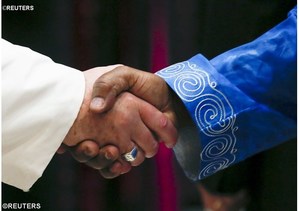
The Archbishop spoke of how religion and interreligious dialogue has grown in importance within the UN. Formerly the emphasis was on social justice projects such as literacy, the elimination of poverty etc with no thought of collaborating with faith communities in achieving these. This has changed as the UN has come to realise the importance of religion and interreligious dialogue for peace and harmony in the world today. So what has changed? The Archbishop gave two reasons: firstly what he called the plague of terrorism and ideologies which use the name of God to perpetrate violence – something Pope Francis has described as blasphemy. But what this does show is that religion is a strong motivating factor for people’s actions (unfortunately for ill as well as for good) which have social consequences. It’s now obvious that religion isn’t a purely private affair and has a place in bodies like the UN which uses religious leaders and experts in many of their social initiatives.
The second reason for the change of heart vis-à-vis religion is the evidence based realisation of how much faith based organisations have contributed to development, particularly in the achievement of the Millennium Development Goals with regard to education, health, the environment. The UN now recognises that religion has an important part to play in its development agenda and sees religious bodies and faiths as partners in this work. It has also come to recognise that religion and dialogue has a part to play in what the Archbishop called statecraft, mentioning a book by Douglas Johnston and Cynthia Sampson, “Religion, the Missing Dimension of Statecraft.” It’s as though the UN has come to realise the truth of Hans Kung’s often quoted saying that there would be no peace in the world without peace between the religions and no peace between the religions without dialogue between the religions. Archbishop Auza confirmed the UN accepts that there will be no development without peace. The reality of our world is that the countries in which there is religious conflict lack development and the societies in which religious diversity is not tolerated or respected are violent. So the Archbishop concluded interreligious dialogue is no longer relegated to places of worship or academia but is now central to the work of the UN. He did also note that this dialogue needs to be done at all levels of society. He talked of how the Bishops of the Congo had recently mediated peace but any work for peace and development is compromised if there is no dialogue on the ground.
This was encouraging for those of us engaged in interfaith relations to hear and gave us a vision wider than the local. We are truly engaged in world peace even if our contribution is small and on a local level. As is usually the case the Archbishop was talking to the converted. His message was one that the wider community – both religious and civic – needed to hear. We’re lucky in Scotland because we have a government that does recognise the role religions play in its social fabric and shows its interest in dialoguing with faith communities even though there are always voices calling for religion to be relegated to the private sphere. Interfaith initiatives are undoubtedly growing but so too is a concern for our own community and a defensiveness and introspection that is the opposite of dialogue. It needs to be encouraged at all levels.
One of the things the Archbishop said that I particularly liked was in response to a question which quoted Henry Kissinger who said that we only need to dialogue with our enemies. Perhaps the focus on peace could give this impression. But the Archbishop was quite clear that while interreligious dialogue is a means to peace it is also a way of life. It is an achievement and an end in itself because it is a way of life which needs to be encouraged. For me and others engaged in interfaith this is certainly so. I have often thought that interfaith gatherings are prophetic in their own way and witness to the world that people of faith can meet, work together, respect one another and even be friends with one another. In fact it’s in the friendships that we are able to tackle difficult issues and points of disagreement between us. But not everyone understands dialogue as a way of life and people come to it with different motivations – some to defend their own faith and position, others to promote their own faith and position, some to get support for a particular social or community project. There are probably as many motivations as there are individuals. This doesn’t matter so much. What’s important is the coming together with respect, honesty and a willingness to listen to those with a different perspective from our own. To do this is to embark on a journey which can eventually lead to dialogue as a way of life.


 RSS Feed
RSS Feed
